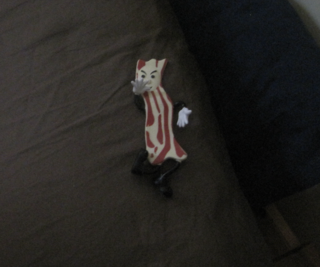Anxiety
Going to Bad Therapists Actually Led Me to a Great One
A Personal Perspective: My journey from bad therapists to a great one.
Posted November 8, 2021 Reviewed by Lybi Ma
Key points
- How I test-drove bad therapists to find a great one.
- A great therapist is the one who helps you.

I’m all for great therapists. I’m totally lucky to have one now—my fifth!—who is smart, intuitive, and who actually changed my life with cognitive-behavioral therapy. But it took me a while to get there. And it took some horror stories, too.
I supposed it didn’t help that my parents instilled in me a distrust of therapists because family secrets were supposed to be just that: secret. But when I was 17 and fell wildly in love with a boy they didn’t like and forbid me to see, I spent the summer sneaking off to his house and to his bed. The stress of lying to my parents, ignoring their threats to call the cops because they knew he dealt drugs, and all the sneaking around took a toll. I slammed out of the house, so hard and fast, I shattered the glass on the front door. I began crying every time I was with my boyfriend, then at school, and then at home. Of course, soaked in all my sorrow and fear, he dropped me.
I couldn’t eat. I couldn’t sleep. I couldn’t stop crying. I knew something was very wrong, but I had no idea how to fix it because back then, none of my friends saw therapists. One night, weeping, I approached my parents and cried, “I need help.”
My father snapped, “The only help you need is to behave.” My mother, kinder, said, “You can talk to us. We’re your parents.” But as soon as I heard that, I turned and left the room, because they were part of the problem. How could I talk to them?
I kept crying. I kept losing weight. My mother took pity and finally took me to a social worker, which seemed less of a stigma to her. And oh, how I loved this social worker! He was patient and kind and he listened to me, and I felt heard. I felt seen. But after the initial visit, he asked my mother if she and my dad would come in for family therapy and my mother shut down. “Your father will never agree to this,” she said, and later, when I asked if I could keep seeing this social worker anyway, she said no.
I didn’t think I would ever see a therapist again, but I did when my first husband left me. This new therapist had been referred by a friend, so I thought I was safe from harm. “She’s brilliant!” my friend told me. But when I got to her office, all I noticed was how cold she was. How she stared. Sometimes we sat in silence for hours and she kept wanting me to talk and talk about my past growing up, the same story over and over.
“What good does it do for me to understand the past?” I asked her. “I know my family dynamics, but what I don’t know is how to live with them, what to do to make it easier. How are you helping me?” Her eyes narrowed. “I disagree,” she snapped. Two weeks later, I decided to stop therapy and she stood up and yanked open the door. “Well you made your decision without talking to me, so there’s nothing for me to say. You’re too much work, anyway."
I was stupefied. I never forgave her. I found another who asked me to lay on the floor and then she asked me why I didn’t get a good haircut.
One day, in Manhattan, I couldn’t breathe. Cold sweat prickled along my body and the feeling of doom was so terrifying, I wailed. I hunched over, grabbing onto a friend, who was actually married to a psychiatrist. “You’re having a panic attack,” she told me. She stayed with me, making me breathe until I calmed, and then she made me promise to get therapy.
Therapy! Absolutely not! But friends began to bombard me about their therapists. One was a brilliant Freudian who got you on the couch. Another used role-playing. My friend mentioned she had to bang a mallet on the couch while shouting, “No!” I shook my head.
But I kept having breathing problems, diagnosed as an issue in my vocal cords. They’re super sensitive and when you panic, they close and you cannot breathe.
But how was I not to panic? A friend suggested her psychiatrist, who she promised was brilliant. He prescribed me low-dose Klonopin, which calmed my vocal cord muscles enough so that my breathing was effortless. But then he wanted to go back, over and over, to talk about family dynamics. “So I understand,” I complained, “but what do I do with it all? How do I change?” He told me it could take years, and that was when I left.
Maybe, I thought, what was called for was a different kind of therapist. And I began to do what I hadn’t before: research. I knew I wanted someone warm. I knew, too, that I didn’t want to spend my time and money just going over and over family dynamics. Understanding was one thing, being able to change was another. “Ah,” one of my friends said. “What you want is cognitive-behavioral therapy. It saved my life.” And then she said the magic words: It’s very practical. And it works.”
I braced myself, and I tried it. I didn’t have to be on a couch. I didn’t have to do all the talking and wonder what the therapist was thinking. One day, I blurted out the same things I used to tell other therapists, that I worried my hearing aid was going to fall out of my ear. Other therapists had wanted me to talk about the role of illness when I was growing up, the power of shame. But this new therapist simply nodded calmly and said, “Has that ever happened before?”
“No,” I said. Then she nodded again. “Why would it happen now? You’re catastrophizing when you don’t need to.”
I felt a light exploding in my head.
I’ve been going to this therapist for nearly two years now. My breathing has gotten so much better that for me to take Klonopin is rare now.
Last week I was supposed to have lunch with a writer I didn’t know. The fears bubbled up: What if she doesn’t like me? What if I say something stupid? But this time, instead of working myself up, I was the one who could work myself down. I could ask myself, has that ever happened before? No? Are you catastrophizing? Yes? End of story.
I know now how important it is for me to have a therapist. And I know, too, that even more important, is to have the right one.
References
Caroline Leavitt’s latest novel is With or Without You. Visit her at www.carolineleavitt.com




